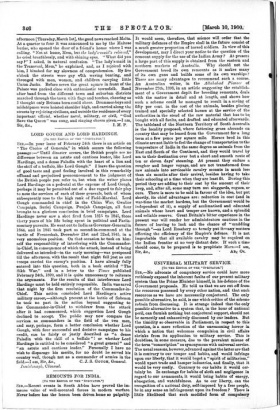REMOUNTS FOR INDIA.
[TO THE EDITOR OP THE "SPECTATOR."] SIE,—Recent events in South Africa have proved the im- mense value of well-mounted forces in modern warfare. Never before has the lesson been driven home so palpably. It would seem, therefore, that science will order that the military defences of the Empire shall in the future consist of a much greater proportion of horsed soldiers. In view of this development, may I direct your notice to the question of the remount supply for the use of the Indian Army ? At present a large part of this supply is obtained from the eastern and southern markets of Australia. Why should not the Government breed its own remounts as it makes many of its own guns and builds some of its own warships ? There are many advantages to recommend such a course. An Australian writer, in the Allahahad Pioneer of November 27th, 1298, in an article suggesting the establish. ment of a Government depOt for breeding remounts, deals with the matter in detail and at length, and shows how such a scheme could be managed to result in a saving of fifty per cent, in the cost of the animals, besides placing trained and specially selected horses at the service of the authorities in the stead of the raw material that has to be bought with all faults, and drafted and educated afterwards. The tableland of the Northern Territory of South Australia is the locality proposed, where fattening grass abounds on country that may be leased from the Government for a long term at a few pence per square mile. Horses bred in this climate are not liable to feel the change of transportation to the temperature of India in the same degree as animals from the East and South of the Continent, and they would travel by sea to their destination over but a short and smooth route of ten or eleven days' steaming. At present they endure a rougher and longer voyage, and are not transformed from raw animals into serviceable cavalry mounts in much less than six months after their arrival, besides having to take their schooling at a time when they are least fit. During this period they are adding to their cost by the amount of their keep, and, after all, some may turn oat sluggards, rogues, or curs. There is more to be said in favour of the idea, but put shortly, its chief advantages are : reduction in cost (and in war-time the market hardens, but the Government would be independent of it), a supply of acclimatised and educated animals whose heart and temper are known, and a splendid and reliable reserve. Great Britain's bitter experience in the present war will render her administrators cautious in the future of leaving to luck and the chance of "muddling through "—as Lord Rosebery so tersely put it-.-any matters affecting the efficiency of the Empire's defence. It is not improbable that all available cavalry may be required on the Indian frontier at no very distant date. If such a time should come, to be prepared is to propitiate Mars.—I am,






































 Previous page
Previous page